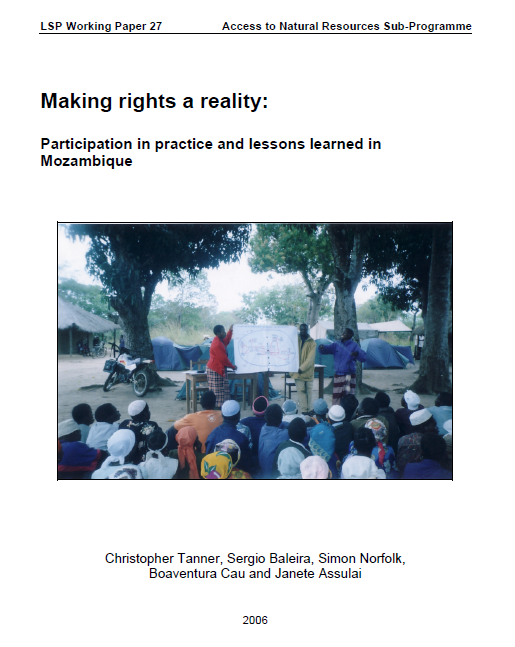Land policies in Sub-Saharan Africa: An Overview" in Akinyi Nzioki, Land Policies in Sub-Sahara Africa, Centre for Land,Economy and rights of women,
The twentieth century will go down in history as a century when Africa fulfilled the dismal Hobbesian prediction. Africa has become the one continent in the world where human life is hardly worth living because of the man-made problems of inequality and impoverishment.
Overcoming inequities in access to natural resources : experiences from Asia
This Working Paper reviews the literature on the equity implications of different arrangements of natural resource management. The focus is on gender, ethnic and economic differences in access to natural resources in Asia, where two-thirds of the world’s poor live.
Guião de Direitos das Comunidades Locais no Domínio dos Recursos Naturais
O Guião de Direitos das Comunidades Locais no Domínio dos Recursos Naturais pretende-se ajudar a obter um melhor conhecimento e compreensão da Constituição da República de Moçambique (no que toca aos recursos naturais) e da legislação do ambiente, terra, florestas e fauna bravia, pescas, minas e água, incluindo os respectivos regulamentos, de forma a contribuir para uma melho
Making rights a reality: Participation in practice and lessons learned in Mozambique
This paper represents part of an area of work which analyses access to natural resources in Mozambique. An initial paper examined the extent to which Mozambique’s recent regulatory changes to natural resource access and management have had their intended effects (LSP Working Paper 17: Norfolk, S. (2004).
Improving Tenure Security for the Rural Poor: Mali Country Case Study. Working Paper No. 4. FAO.
The present study aims to clarify the various issues regarding land security of poor and other marginalized groups in Malian rural areas. It looks into questions relating to how poor and vulnerable groups obtain access to land and natural resources, and what factors cause their exclusion.
Better land access for the rural poor. Lessons from experience and challenges ahead
Main chapters cover access to land and poverty reduction, land redistribution, and securing land rights. The last includes the role of land markets, women’s land rights, securing local resource rights in foreign investment projects, protecting the rights of indigenous peoples and pastoralists, conflicts.
DRAFT LAND ADMINISTRATION AND MANAGEMENT POLICY
Land is the most fundamental resource in any society because it is the basis of human survival. Land is the space upon which all human activities take place and provides continued existence of all life forms and minerals.
Women’s Land Rights in Rwanda: How can they be protected and strengthened as the Land Law is implemented?
Research findings include: land rights in marriage and during cohabitation; daughters and inheritance rights; land disputes; land administration and registration; education and monitoring implementation of the Land Law.
Women’s Land Rights in Rwanda: How can they be protected and strengthened as the Land Law is implemented
In Rwanda, two factors make land a highly important and contested issue. First,
Rwanda has the highest person-to-land ratio in Africa. This creates tremendous
pressure on land in a country where most of the population lives in rural areas, and
where agriculture remains the central economic activity. Second, Rwanda is recovering
Quelles lois pour résoudre les problèmes liés au foncier en Côte d’Ivoire ?
« Le succès de ce pays repose sur l’agriculture », ce slogan longtemps véhiculé par les médias ivoiriens depuis des décennies est en passe de devenir un leurre ou mythe, tant la situation agricole et la situation foncière sont progressivement devenues colporteuses de tensions sociales et politiques dans ce pays en guerre depuis septembre 2002.
How Title Deeds Make Sex Safer: Women’s Property Rights in an Era of HIV
Contains introduction: property rights, inheritance, and HIV; the impact on development; challenging the roots of the problem; modern laws and individual rights: do they always support women?; pinpointing the difficulties with the existing legal frameworks; ways forward.






